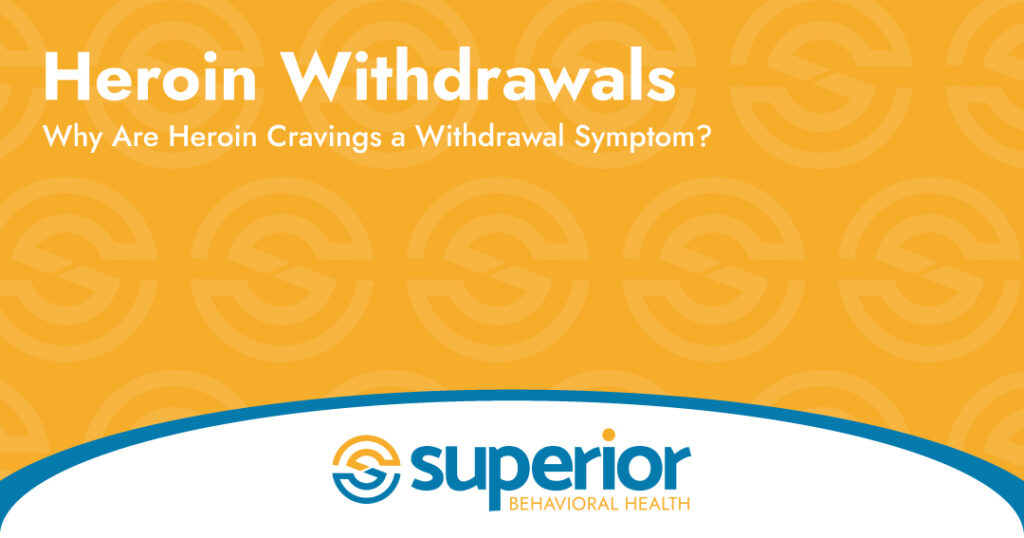When it comes to heroin, you may only know the exaggerated depictions of those using it from movies and TV. You may remember their desperate pursuit of heroin while experiencing withdrawals. Heroin is a very real concern, though. The Ohio Department of Public Safety seized 28.1 lbs. of heroin over six months in the Cleveland area, proving how much it’s used. Maybe you know this on a personal level. We certainly do at Superior Behavioral Health. If you’re here due to uncertainty, wondering if someone in your life is experiencing heroin withdrawals, you’re in the right place. Here are the symptoms of heroin withdrawals.
Defining Heroin Withdrawals
Heroin withdrawal, commonly known as “heroin withdrawals,” is the process you go through when you suddenly stop heroin after your body has grown dependent on it. Heroin withdrawal occurs because long-term heroin use alters the way your brain and body work. They’re used to receiving heroin, so they need to adjust to living without it, which causes withdrawals. This process is usually painful, and a large part of the reason why people with heroin use disorders continue using heroin.

The Wide Range of Heroin Withdrawal Symptoms
There are several symptoms of heroin withdrawal, ranging from mild to severe. While the following list is large, it’s important to remember it’s not comprehensive, and the symptoms people experience vary depending on the individual.
Mild and Moderate Symptoms of Heroin Withdrawal
People rarely die due to withdrawals, so what you define as “mild” and “moderate” also tends to depend on each individual and how tolerable their symptoms are. Heroin withdrawals share many symptoms similar to the flu, but often feel worse. Common symptoms include:
- Chills and fever
- Runny nose and watery eyes
- Sweating, sometimes to the extreme
- Abdominal pain
- Constipation
- Nausea, vomiting and diarrhea
- Irritability, anxiety, and depression, and trouble concentrating
- Restlessness
- Muscles aches, spasms, and soreness
- Fatigue
- Insomnia
- Tremors
- Shortness of breath
Severe Symptoms of Withdrawal and Why They’re Dangerous
Some withdrawal symptoms are more serious than others, especially for people who have other medical concerns. Heroin withdrawal also increases blood pressure and heart rate, which can be dangerous for those already experiencing those conditions. Without sufficient fluids, people whose withdrawal symptoms involve vomiting and diarrhea can get dehydrated, which is the leading cause of death in those experiencing heroin withdrawal.
Heroin Use and the Brain: Why Are Heroin Cravings a Withdrawal Symptom?
A prominent symptom of heroin withdrawal is craving more heroin. Why is that the case?
Heroin changes how the brain works. Heroin is an opioid, and when it’s taken, it connects to the opioid receptors in your brain. This releases chemicals in your brain, including dopamine and serotonin, associated with pain relief, relaxation, and generally “feeling good.” The more you take heroin, your brain grows used to receiving its synthetic opioids and produces less of its own. Your brain anticipates receiving heroin to produce dopamine and serotonin properly. This can lead to depression when you aren’t taking heroin, and intense cravings to feel pleasure again and satisfy your brain. It’s important to fight these cravings and not take more heroin. Taking heroin at this stage can be especially dangerous, and can even lead to overdose if you take the same amount you were taking before.

How Long Does Heroin Withdrawal Last?
It depends on each person, but on average, heroin withdrawal lasts from 5-10 days. The worst symptoms tend to occur 48-72 hours after the last dose of heroin.
Heroin Withdrawal Treatment: Medications and Where to Find Help
Thankfully, you don’t have to go through heroin withdrawal alone. There is heroin addiction treatment available. One treatment option is medication-assisted treatment (MAT). Common medications used for MAT are Suboxone and Vivitrol.
Suboxone binds to the same opioid receptors that heroin does but with a much weaker effect. This can help individuals early in the treatment process manage cravings and lessen withdrawal symptoms so they can focus on their recovery.
Vivitrol blocks the effects of both opioids and alcohol, and also helps reduce cravings.
At Superior Behavioral Health, we offer medication-assisted treatment and far more to set you on a path toward a substance-free life. For more on what we offer, including same-day appointments, give us a call at 216-435-1110.
FAQs
How do you prevent withdrawal symptoms?
Withdrawal symptoms are difficult to prevent without professional help. Medication-assisted treatment can be used by professionals to lessen withdrawal symptoms and help people with substance use disorders recover.


